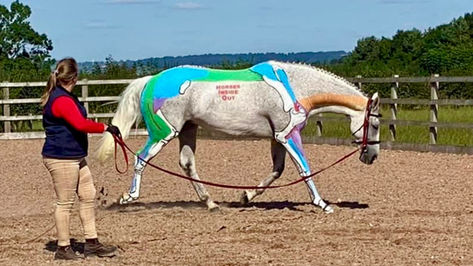Myofascial Chains
2 Day CPD Course for Professional Equine Therapists
with Gillian Higgins
Thursday and Friday 19th and 20th June 2025
Wavendon Grange, Lawn Lane, Old Dalby, Leicestershire, LE14 3LW
Muscles of opposite action work together in groups of pairs and those groups work together in chains. These myofascial chains, which can be dissected, connect all parts of the body together. Understanding their connections helps to explain equine movement, function, compensation patterns and postural and movement alterations following injury.
In this course, we look at the anatomy and biomechanics of all the myofascial chains within the horse and how they connect together. Gillian explains the postural and movement alterations you can expect to see when there is weakness, tension or problems within each chain. She demonstrates observation and assessment techniques and how to test each chain.
As well as a variety of stretching and strengthening exercises that can be performed in hand, ridden or in the stable, Gillian will demonstrate myofascial release techniques to improve myofascial health and balance.

Course Trailer
This course is suitable for qualified therapists from all disciplines wishing to revise techniques or explore new ones to add to their toolbox.
It is a mix of theory, practical demonstrations and small group hands-on practical sessions. It also provides the opportunity to network, share information and discuss interesting or challenging cases with other practitioners in a relaxed and supportive environment.
This course is a brilliant follow on from the
Fascia Release Techniques Course
which runs on the Monday and Tuesday just before this course.
If you would like to read another therapists review of the day check out this blog article.
Key Points
During this course Gillian will examine the anatomy and connections of the myofascial chains including the:-
Spinal flexor / ventral chains
Spinal extensor / dorsal chains
Forelimb protraction chain
Forelimb retration chain
Abduction chains
Adduction chains
Lateral flexion chains
After studing the anatomy and connections for each chain we will consider techniques during the practical sessions which will include chain:-
palpation
assessment
tests
therapeutic techniques
stretching exercises
strengthening eexercises

Provisional Timetable
DAY 1
09.00: Registration and Coffee
09.30: An introduction to Myofascial Chains
Classroom Session
10.00: The Extensor Chains
The Anatomy, Tests, Exercises and Techniques
11.15 Break
11.45: The Flexor Chains
The Anatomy, Tests, Exercises and Techniques
13.00: Lunch
14.00: The Forelimb Protraction Chain
The Anatomy, Tests, Exercises and Techniques
15.00: Break
15.30: The Forelimb Retraction Chain
The Anatomy, Tests, Exercises and Techniques
16.30: Questions and Discussion
17.00: Close
DAY 2
09.00: Coffee
09.30: Questions and Discussion
10.00: The Thoracic Sling Muscles
The Anatomy, Tests, Exercises and Techniques
11.00: Break
11.30: Forelimb Abduction Chains
The Anatomy, Tests, Exercises and Techniques
12.30: Lunch
13.30: Hindlimb Abduction Chain
The Anatomy, Tests, Exercises and Techniques
14.30: Break
15.00: Myofascial Chains Painted Overview
16.00: Questions and Discussion
16.30: Close
Notes
We envisage this course to be very popular so early booking is advised.
Certificates of Participation (CPD) will be emailed after the course. Course notes will be provided.
Tea, coffee, home-made cakes and a light lunch of sandwiches, crisps and fruit is included.
This course is held both inside and out so please bring appropriate warm clothes for a day out on the yard.
This course is limited to 14 people to ensure small groups and individual attention.
Prerequisites
All participants must provide proof of professional equine therapy qualification and current professional indemnity insurance.
BEFORE ATTENDING THIS PRACTICAL COURSE ALL PARTICIPANTS MUST WATCH THE THEORY ELEMENT:
Prices
Course Leader
Gillian Higgins
Gillian is an equine anatomist, biomechanist, BHS Senior Coach, professional Sports and Remedial Therapist and author with a first class honours degree in Equine Science and Business Management.
Gillian is passionate about posture. She specialises in assessing the musculoskeletal systems and designing exercise programmes for improving posture and performance as well as assessing and addressing individual horses’ weaknesses.
Gillian has studied a variety of equine and human modalities both traditional and holistic.
As well as conventional training, Gillian has studied equine therapies in America, France, Germany and Sweden and is committed to giving our equine partners the best possible levels of care and consideration.
Gillian works with horses from all disciplines and levels from leisure to Olympic.
Venue and Horses

All of Gillian's courses are supported by a wealth of photographs and video footage taken from years worth of work including footage of her anatomically painted horses and from her dissections.
Also on the day of the course, you will have access to Gillian's large collection of bones and anatomical models.
This ensures that you will be better able to visualise the structures we discuss on this course.
This course is run at the Horses Inside Out headquarters, Wavendon Grange near Melton Mowbray in Leicestershire.
The facilities at this central UK location include a small yard with a variety of horses, arenas and a classroom complete with audiovisual facilities.
This is a comfortable and professional space for learning where you are always guaranteed a friendly welcome.
Gillian has many bones, skeletons and anatomical models in the teaching barn for you to view and handle.
Being able to bring horses into the teaching barn alongside the anatomical models really helps to combine the theory and the practice!






















